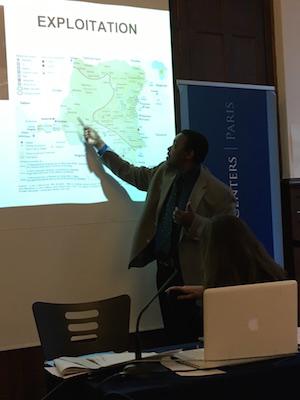Margot and Albane offered some historical background of the situation, shocking the audience with statistics that reveal the gravity of everyday life in the Kivu region: 48 women are raped every hour, the use of child soldiers is common, and deforestation runs rampant in the second-largest reserve in the world. As a result of this social climate, millions of people have been displaced and at least 6 million people have been killed.
The two students showed video clips from the film The Man Who Mends Women, a documentary focusing on Dr. Mukwege, who works to heal thousands of women who have been raped during the 20 years that this conflict has taken place. The excerpts offered graphic depictions of the results of this violence, and displayed conversations with the medical workers and the women they treat.
Maître Hamuli Réty, former President of the Lawyers of the International Criminal Tribunal in Arusha, also participated. Réty has spearheaded a letter-writing campaign to major decision-making bodies for the creation of an International Criminal Court against rape as a weapon of war in armed conflict.
